Legal and Ethical Issues: Analysis of Three Case Studies
VerifiedAdded on 2022/08/20
|9
|2689
|9
Case Study
AI Summary
This assignment presents an analysis of three distinct case studies, each highlighting various legal and ethical dilemmas. The first case examines a caregiver's breach of duty of care by providing sweets to a diabetic patient and failing to adhere to medical advice, raising concerns about professional integrity and patient rights. The second case focuses on child abuse, specifically the physical mistreatment of a child by her mother and the teacher's failure to report the incident, emphasizing the law of mandatory reporting. The final case explores issues of marijuana use, trafficking, and tenant rights, involving the illegal activities of a tenant and her grandson, as well as the tenant's disturbance of other residents. The analysis covers legal violations, ethical breaches, and the responsibilities of individuals involved, offering potential actions to be taken in each scenario. The document emphasizes the importance of ethical conduct, adherence to legal regulations, and the protection of vulnerable individuals.
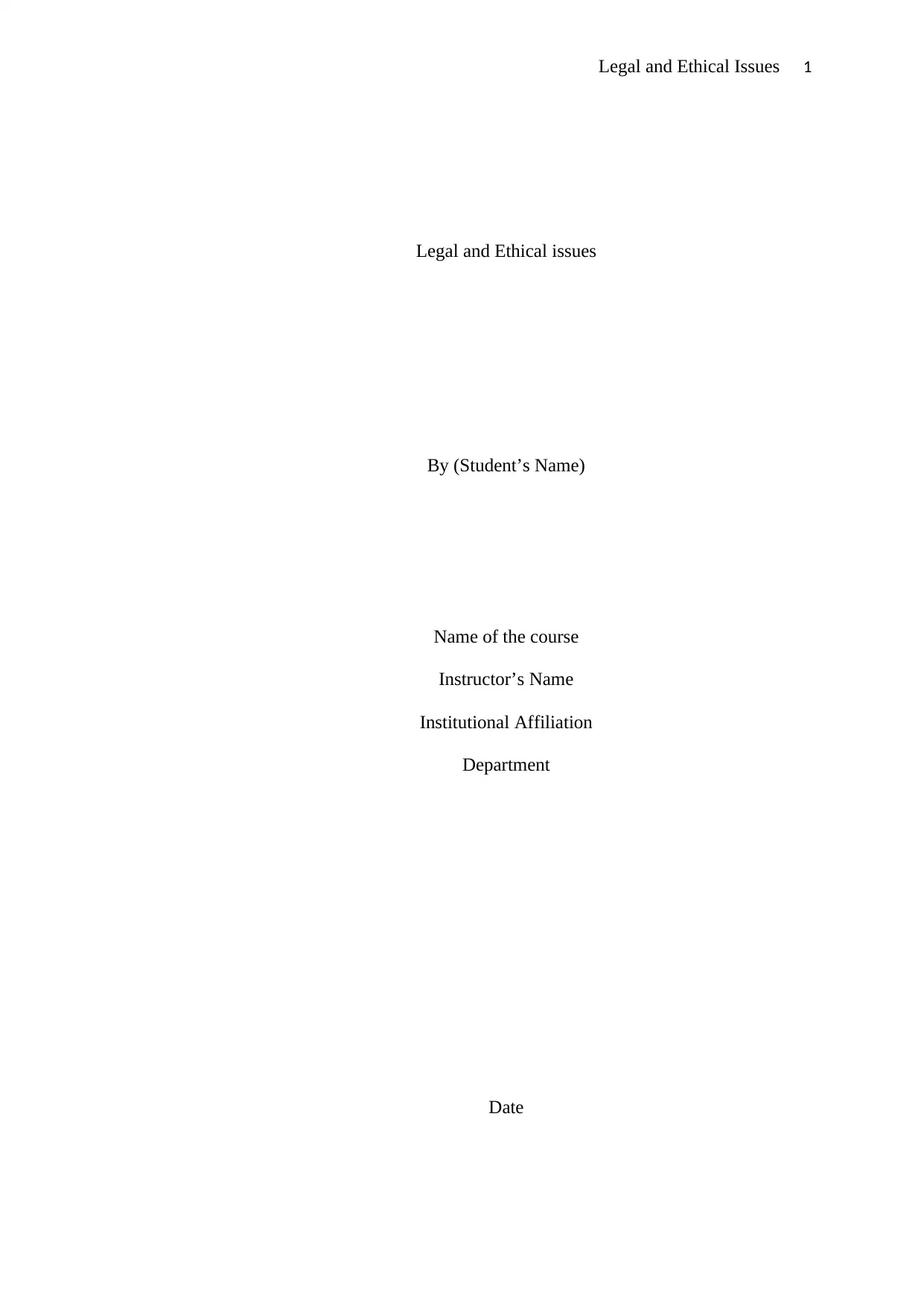
Legal and Ethical Issues 1
Legal and Ethical issues
By (Student’s Name)
Name of the course
Instructor’s Name
Institutional Affiliation
Department
Date
Legal and Ethical issues
By (Student’s Name)
Name of the course
Instructor’s Name
Institutional Affiliation
Department
Date
Paraphrase This Document
Need a fresh take? Get an instant paraphrase of this document with our AI Paraphraser
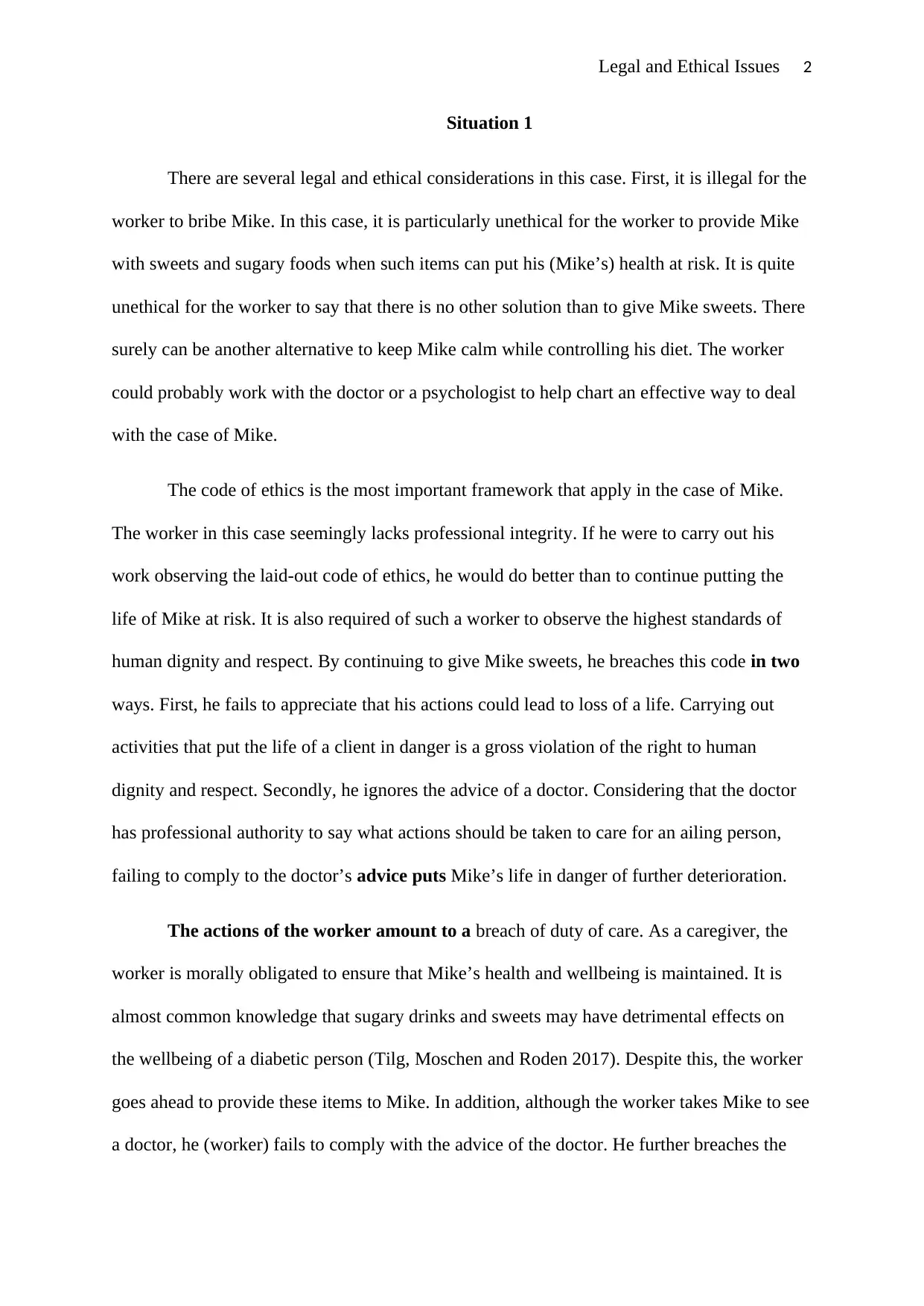
Legal and Ethical Issues 2
Situation 1
There are several legal and ethical considerations in this case. First, it is illegal for the
worker to bribe Mike. In this case, it is particularly unethical for the worker to provide Mike
with sweets and sugary foods when such items can put his (Mike’s) health at risk. It is quite
unethical for the worker to say that there is no other solution than to give Mike sweets. There
surely can be another alternative to keep Mike calm while controlling his diet. The worker
could probably work with the doctor or a psychologist to help chart an effective way to deal
with the case of Mike.
The code of ethics is the most important framework that apply in the case of Mike.
The worker in this case seemingly lacks professional integrity. If he were to carry out his
work observing the laid-out code of ethics, he would do better than to continue putting the
life of Mike at risk. It is also required of such a worker to observe the highest standards of
human dignity and respect. By continuing to give Mike sweets, he breaches this code in two
ways. First, he fails to appreciate that his actions could lead to loss of a life. Carrying out
activities that put the life of a client in danger is a gross violation of the right to human
dignity and respect. Secondly, he ignores the advice of a doctor. Considering that the doctor
has professional authority to say what actions should be taken to care for an ailing person,
failing to comply to the doctor’s advice puts Mike’s life in danger of further deterioration.
The actions of the worker amount to a breach of duty of care. As a caregiver, the
worker is morally obligated to ensure that Mike’s health and wellbeing is maintained. It is
almost common knowledge that sugary drinks and sweets may have detrimental effects on
the wellbeing of a diabetic person (Tilg, Moschen and Roden 2017). Despite this, the worker
goes ahead to provide these items to Mike. In addition, although the worker takes Mike to see
a doctor, he (worker) fails to comply with the advice of the doctor. He further breaches the
Situation 1
There are several legal and ethical considerations in this case. First, it is illegal for the
worker to bribe Mike. In this case, it is particularly unethical for the worker to provide Mike
with sweets and sugary foods when such items can put his (Mike’s) health at risk. It is quite
unethical for the worker to say that there is no other solution than to give Mike sweets. There
surely can be another alternative to keep Mike calm while controlling his diet. The worker
could probably work with the doctor or a psychologist to help chart an effective way to deal
with the case of Mike.
The code of ethics is the most important framework that apply in the case of Mike.
The worker in this case seemingly lacks professional integrity. If he were to carry out his
work observing the laid-out code of ethics, he would do better than to continue putting the
life of Mike at risk. It is also required of such a worker to observe the highest standards of
human dignity and respect. By continuing to give Mike sweets, he breaches this code in two
ways. First, he fails to appreciate that his actions could lead to loss of a life. Carrying out
activities that put the life of a client in danger is a gross violation of the right to human
dignity and respect. Secondly, he ignores the advice of a doctor. Considering that the doctor
has professional authority to say what actions should be taken to care for an ailing person,
failing to comply to the doctor’s advice puts Mike’s life in danger of further deterioration.
The actions of the worker amount to a breach of duty of care. As a caregiver, the
worker is morally obligated to ensure that Mike’s health and wellbeing is maintained. It is
almost common knowledge that sugary drinks and sweets may have detrimental effects on
the wellbeing of a diabetic person (Tilg, Moschen and Roden 2017). Despite this, the worker
goes ahead to provide these items to Mike. In addition, although the worker takes Mike to see
a doctor, he (worker) fails to comply with the advice of the doctor. He further breaches the
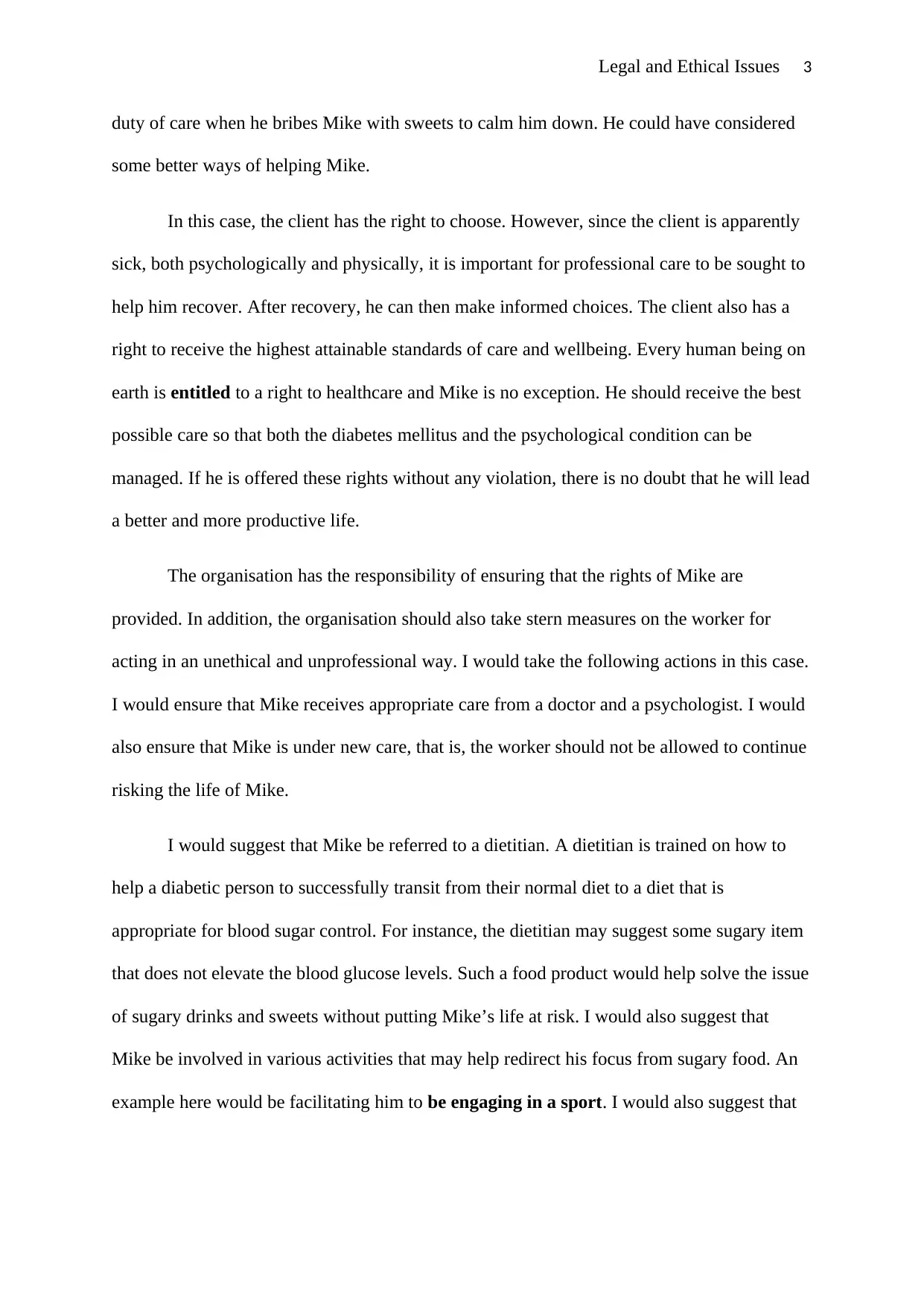
Legal and Ethical Issues 3
duty of care when he bribes Mike with sweets to calm him down. He could have considered
some better ways of helping Mike.
In this case, the client has the right to choose. However, since the client is apparently
sick, both psychologically and physically, it is important for professional care to be sought to
help him recover. After recovery, he can then make informed choices. The client also has a
right to receive the highest attainable standards of care and wellbeing. Every human being on
earth is entitled to a right to healthcare and Mike is no exception. He should receive the best
possible care so that both the diabetes mellitus and the psychological condition can be
managed. If he is offered these rights without any violation, there is no doubt that he will lead
a better and more productive life.
The organisation has the responsibility of ensuring that the rights of Mike are
provided. In addition, the organisation should also take stern measures on the worker for
acting in an unethical and unprofessional way. I would take the following actions in this case.
I would ensure that Mike receives appropriate care from a doctor and a psychologist. I would
also ensure that Mike is under new care, that is, the worker should not be allowed to continue
risking the life of Mike.
I would suggest that Mike be referred to a dietitian. A dietitian is trained on how to
help a diabetic person to successfully transit from their normal diet to a diet that is
appropriate for blood sugar control. For instance, the dietitian may suggest some sugary item
that does not elevate the blood glucose levels. Such a food product would help solve the issue
of sugary drinks and sweets without putting Mike’s life at risk. I would also suggest that
Mike be involved in various activities that may help redirect his focus from sugary food. An
example here would be facilitating him to be engaging in a sport. I would also suggest that
duty of care when he bribes Mike with sweets to calm him down. He could have considered
some better ways of helping Mike.
In this case, the client has the right to choose. However, since the client is apparently
sick, both psychologically and physically, it is important for professional care to be sought to
help him recover. After recovery, he can then make informed choices. The client also has a
right to receive the highest attainable standards of care and wellbeing. Every human being on
earth is entitled to a right to healthcare and Mike is no exception. He should receive the best
possible care so that both the diabetes mellitus and the psychological condition can be
managed. If he is offered these rights without any violation, there is no doubt that he will lead
a better and more productive life.
The organisation has the responsibility of ensuring that the rights of Mike are
provided. In addition, the organisation should also take stern measures on the worker for
acting in an unethical and unprofessional way. I would take the following actions in this case.
I would ensure that Mike receives appropriate care from a doctor and a psychologist. I would
also ensure that Mike is under new care, that is, the worker should not be allowed to continue
risking the life of Mike.
I would suggest that Mike be referred to a dietitian. A dietitian is trained on how to
help a diabetic person to successfully transit from their normal diet to a diet that is
appropriate for blood sugar control. For instance, the dietitian may suggest some sugary item
that does not elevate the blood glucose levels. Such a food product would help solve the issue
of sugary drinks and sweets without putting Mike’s life at risk. I would also suggest that
Mike be involved in various activities that may help redirect his focus from sugary food. An
example here would be facilitating him to be engaging in a sport. I would also suggest that
⊘ This is a preview!⊘
Do you want full access?
Subscribe today to unlock all pages.

Trusted by 1+ million students worldwide
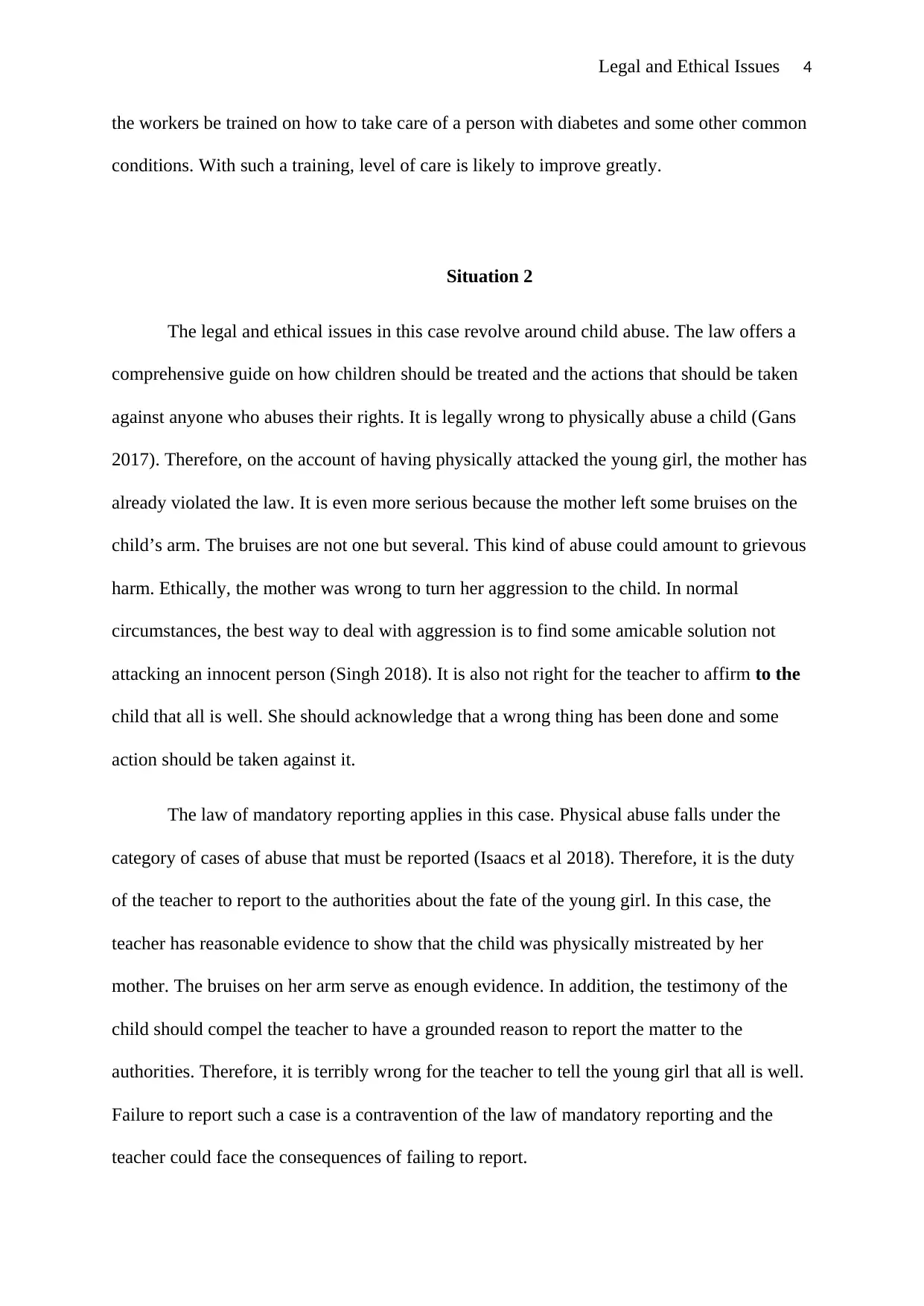
Legal and Ethical Issues 4
the workers be trained on how to take care of a person with diabetes and some other common
conditions. With such a training, level of care is likely to improve greatly.
Situation 2
The legal and ethical issues in this case revolve around child abuse. The law offers a
comprehensive guide on how children should be treated and the actions that should be taken
against anyone who abuses their rights. It is legally wrong to physically abuse a child (Gans
2017). Therefore, on the account of having physically attacked the young girl, the mother has
already violated the law. It is even more serious because the mother left some bruises on the
child’s arm. The bruises are not one but several. This kind of abuse could amount to grievous
harm. Ethically, the mother was wrong to turn her aggression to the child. In normal
circumstances, the best way to deal with aggression is to find some amicable solution not
attacking an innocent person (Singh 2018). It is also not right for the teacher to affirm to the
child that all is well. She should acknowledge that a wrong thing has been done and some
action should be taken against it.
The law of mandatory reporting applies in this case. Physical abuse falls under the
category of cases of abuse that must be reported (Isaacs et al 2018). Therefore, it is the duty
of the teacher to report to the authorities about the fate of the young girl. In this case, the
teacher has reasonable evidence to show that the child was physically mistreated by her
mother. The bruises on her arm serve as enough evidence. In addition, the testimony of the
child should compel the teacher to have a grounded reason to report the matter to the
authorities. Therefore, it is terribly wrong for the teacher to tell the young girl that all is well.
Failure to report such a case is a contravention of the law of mandatory reporting and the
teacher could face the consequences of failing to report.
the workers be trained on how to take care of a person with diabetes and some other common
conditions. With such a training, level of care is likely to improve greatly.
Situation 2
The legal and ethical issues in this case revolve around child abuse. The law offers a
comprehensive guide on how children should be treated and the actions that should be taken
against anyone who abuses their rights. It is legally wrong to physically abuse a child (Gans
2017). Therefore, on the account of having physically attacked the young girl, the mother has
already violated the law. It is even more serious because the mother left some bruises on the
child’s arm. The bruises are not one but several. This kind of abuse could amount to grievous
harm. Ethically, the mother was wrong to turn her aggression to the child. In normal
circumstances, the best way to deal with aggression is to find some amicable solution not
attacking an innocent person (Singh 2018). It is also not right for the teacher to affirm to the
child that all is well. She should acknowledge that a wrong thing has been done and some
action should be taken against it.
The law of mandatory reporting applies in this case. Physical abuse falls under the
category of cases of abuse that must be reported (Isaacs et al 2018). Therefore, it is the duty
of the teacher to report to the authorities about the fate of the young girl. In this case, the
teacher has reasonable evidence to show that the child was physically mistreated by her
mother. The bruises on her arm serve as enough evidence. In addition, the testimony of the
child should compel the teacher to have a grounded reason to report the matter to the
authorities. Therefore, it is terribly wrong for the teacher to tell the young girl that all is well.
Failure to report such a case is a contravention of the law of mandatory reporting and the
teacher could face the consequences of failing to report.
Paraphrase This Document
Need a fresh take? Get an instant paraphrase of this document with our AI Paraphraser
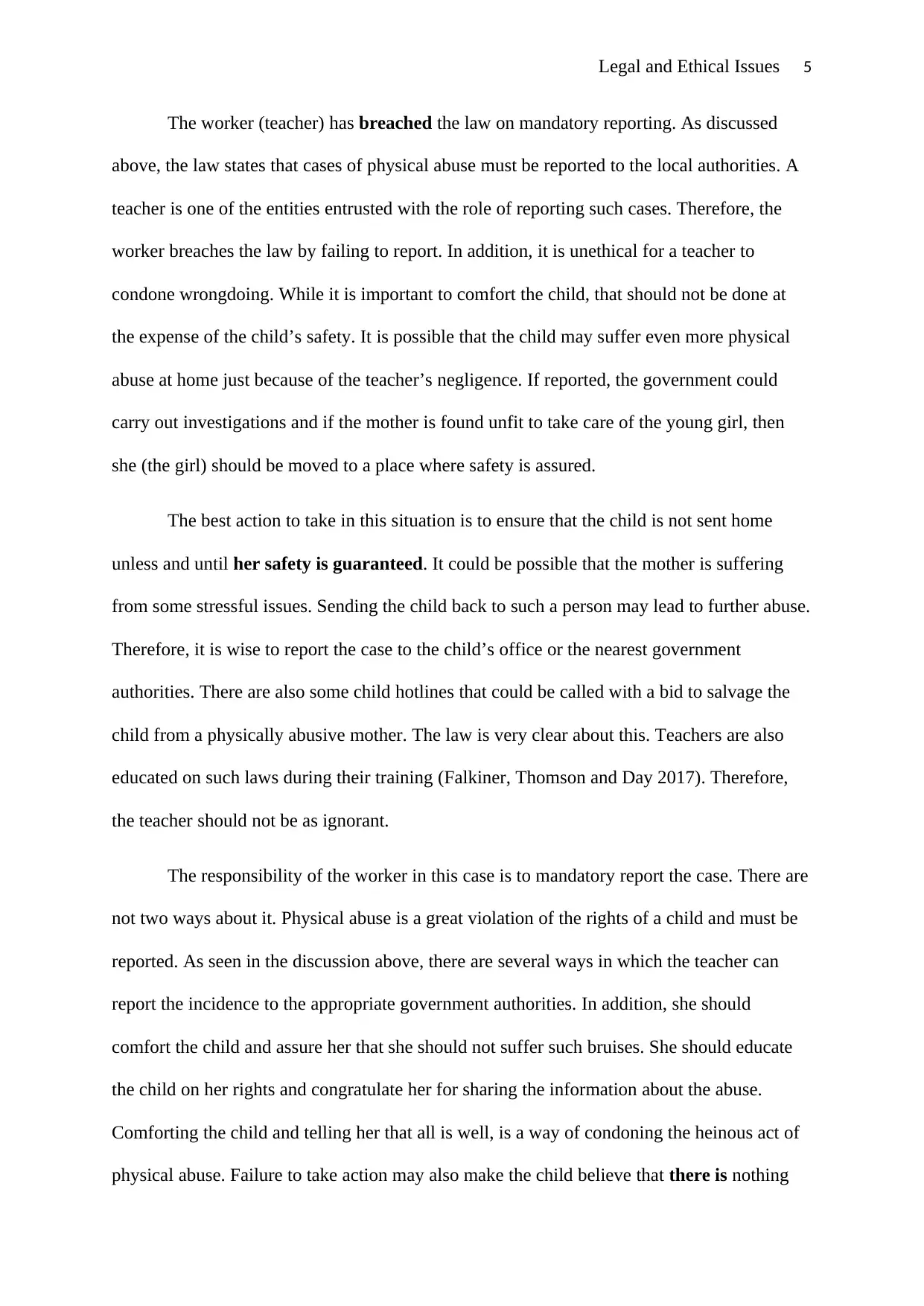
Legal and Ethical Issues 5
The worker (teacher) has breached the law on mandatory reporting. As discussed
above, the law states that cases of physical abuse must be reported to the local authorities. A
teacher is one of the entities entrusted with the role of reporting such cases. Therefore, the
worker breaches the law by failing to report. In addition, it is unethical for a teacher to
condone wrongdoing. While it is important to comfort the child, that should not be done at
the expense of the child’s safety. It is possible that the child may suffer even more physical
abuse at home just because of the teacher’s negligence. If reported, the government could
carry out investigations and if the mother is found unfit to take care of the young girl, then
she (the girl) should be moved to a place where safety is assured.
The best action to take in this situation is to ensure that the child is not sent home
unless and until her safety is guaranteed. It could be possible that the mother is suffering
from some stressful issues. Sending the child back to such a person may lead to further abuse.
Therefore, it is wise to report the case to the child’s office or the nearest government
authorities. There are also some child hotlines that could be called with a bid to salvage the
child from a physically abusive mother. The law is very clear about this. Teachers are also
educated on such laws during their training (Falkiner, Thomson and Day 2017). Therefore,
the teacher should not be as ignorant.
The responsibility of the worker in this case is to mandatory report the case. There are
not two ways about it. Physical abuse is a great violation of the rights of a child and must be
reported. As seen in the discussion above, there are several ways in which the teacher can
report the incidence to the appropriate government authorities. In addition, she should
comfort the child and assure her that she should not suffer such bruises. She should educate
the child on her rights and congratulate her for sharing the information about the abuse.
Comforting the child and telling her that all is well, is a way of condoning the heinous act of
physical abuse. Failure to take action may also make the child believe that there is nothing
The worker (teacher) has breached the law on mandatory reporting. As discussed
above, the law states that cases of physical abuse must be reported to the local authorities. A
teacher is one of the entities entrusted with the role of reporting such cases. Therefore, the
worker breaches the law by failing to report. In addition, it is unethical for a teacher to
condone wrongdoing. While it is important to comfort the child, that should not be done at
the expense of the child’s safety. It is possible that the child may suffer even more physical
abuse at home just because of the teacher’s negligence. If reported, the government could
carry out investigations and if the mother is found unfit to take care of the young girl, then
she (the girl) should be moved to a place where safety is assured.
The best action to take in this situation is to ensure that the child is not sent home
unless and until her safety is guaranteed. It could be possible that the mother is suffering
from some stressful issues. Sending the child back to such a person may lead to further abuse.
Therefore, it is wise to report the case to the child’s office or the nearest government
authorities. There are also some child hotlines that could be called with a bid to salvage the
child from a physically abusive mother. The law is very clear about this. Teachers are also
educated on such laws during their training (Falkiner, Thomson and Day 2017). Therefore,
the teacher should not be as ignorant.
The responsibility of the worker in this case is to mandatory report the case. There are
not two ways about it. Physical abuse is a great violation of the rights of a child and must be
reported. As seen in the discussion above, there are several ways in which the teacher can
report the incidence to the appropriate government authorities. In addition, she should
comfort the child and assure her that she should not suffer such bruises. She should educate
the child on her rights and congratulate her for sharing the information about the abuse.
Comforting the child and telling her that all is well, is a way of condoning the heinous act of
physical abuse. Failure to take action may also make the child believe that there is nothing
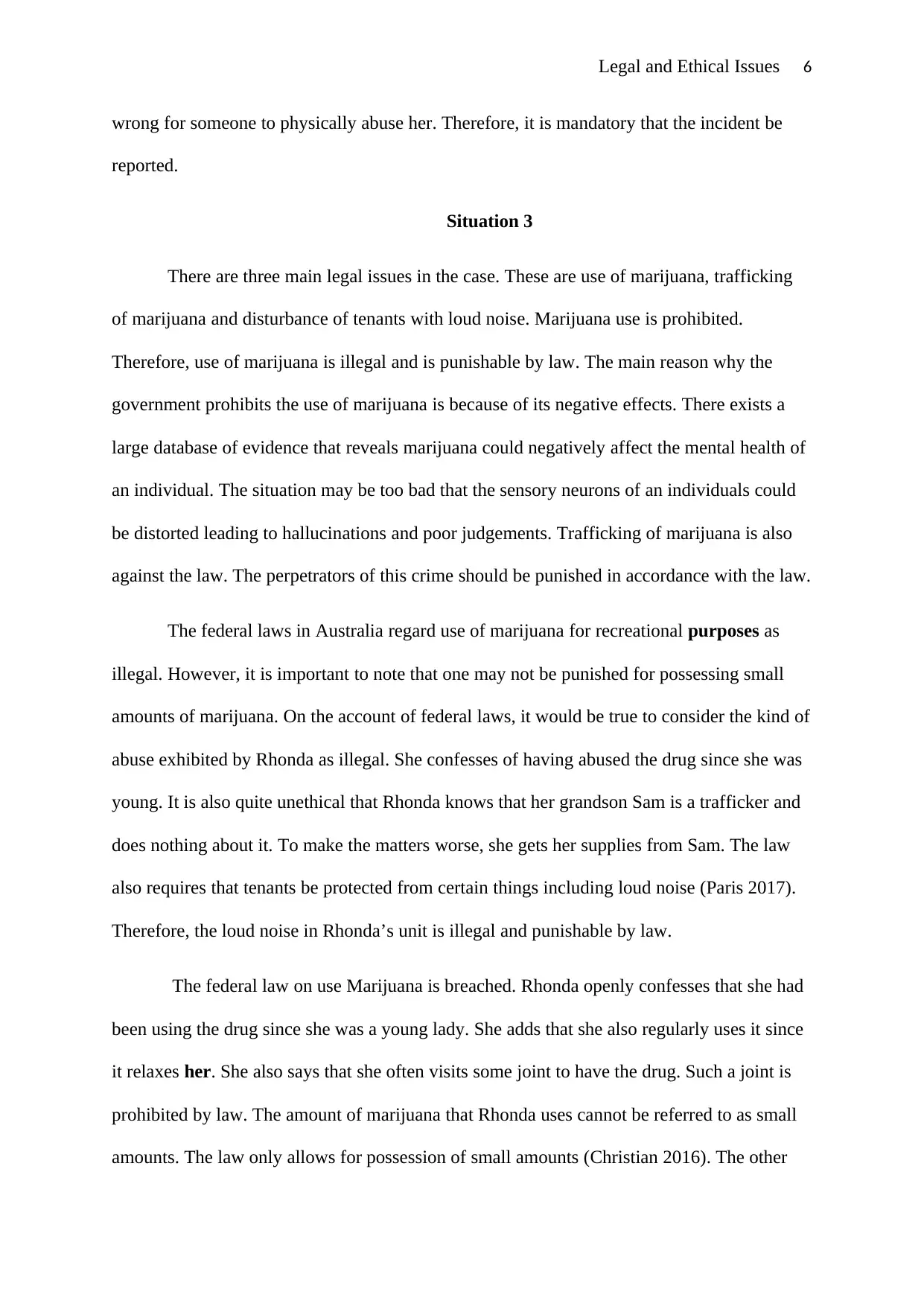
Legal and Ethical Issues 6
wrong for someone to physically abuse her. Therefore, it is mandatory that the incident be
reported.
Situation 3
There are three main legal issues in the case. These are use of marijuana, trafficking
of marijuana and disturbance of tenants with loud noise. Marijuana use is prohibited.
Therefore, use of marijuana is illegal and is punishable by law. The main reason why the
government prohibits the use of marijuana is because of its negative effects. There exists a
large database of evidence that reveals marijuana could negatively affect the mental health of
an individual. The situation may be too bad that the sensory neurons of an individuals could
be distorted leading to hallucinations and poor judgements. Trafficking of marijuana is also
against the law. The perpetrators of this crime should be punished in accordance with the law.
The federal laws in Australia regard use of marijuana for recreational purposes as
illegal. However, it is important to note that one may not be punished for possessing small
amounts of marijuana. On the account of federal laws, it would be true to consider the kind of
abuse exhibited by Rhonda as illegal. She confesses of having abused the drug since she was
young. It is also quite unethical that Rhonda knows that her grandson Sam is a trafficker and
does nothing about it. To make the matters worse, she gets her supplies from Sam. The law
also requires that tenants be protected from certain things including loud noise (Paris 2017).
Therefore, the loud noise in Rhonda’s unit is illegal and punishable by law.
The federal law on use Marijuana is breached. Rhonda openly confesses that she had
been using the drug since she was a young lady. She adds that she also regularly uses it since
it relaxes her. She also says that she often visits some joint to have the drug. Such a joint is
prohibited by law. The amount of marijuana that Rhonda uses cannot be referred to as small
amounts. The law only allows for possession of small amounts (Christian 2016). The other
wrong for someone to physically abuse her. Therefore, it is mandatory that the incident be
reported.
Situation 3
There are three main legal issues in the case. These are use of marijuana, trafficking
of marijuana and disturbance of tenants with loud noise. Marijuana use is prohibited.
Therefore, use of marijuana is illegal and is punishable by law. The main reason why the
government prohibits the use of marijuana is because of its negative effects. There exists a
large database of evidence that reveals marijuana could negatively affect the mental health of
an individual. The situation may be too bad that the sensory neurons of an individuals could
be distorted leading to hallucinations and poor judgements. Trafficking of marijuana is also
against the law. The perpetrators of this crime should be punished in accordance with the law.
The federal laws in Australia regard use of marijuana for recreational purposes as
illegal. However, it is important to note that one may not be punished for possessing small
amounts of marijuana. On the account of federal laws, it would be true to consider the kind of
abuse exhibited by Rhonda as illegal. She confesses of having abused the drug since she was
young. It is also quite unethical that Rhonda knows that her grandson Sam is a trafficker and
does nothing about it. To make the matters worse, she gets her supplies from Sam. The law
also requires that tenants be protected from certain things including loud noise (Paris 2017).
Therefore, the loud noise in Rhonda’s unit is illegal and punishable by law.
The federal law on use Marijuana is breached. Rhonda openly confesses that she had
been using the drug since she was a young lady. She adds that she also regularly uses it since
it relaxes her. She also says that she often visits some joint to have the drug. Such a joint is
prohibited by law. The amount of marijuana that Rhonda uses cannot be referred to as small
amounts. The law only allows for possession of small amounts (Christian 2016). The other
⊘ This is a preview!⊘
Do you want full access?
Subscribe today to unlock all pages.

Trusted by 1+ million students worldwide
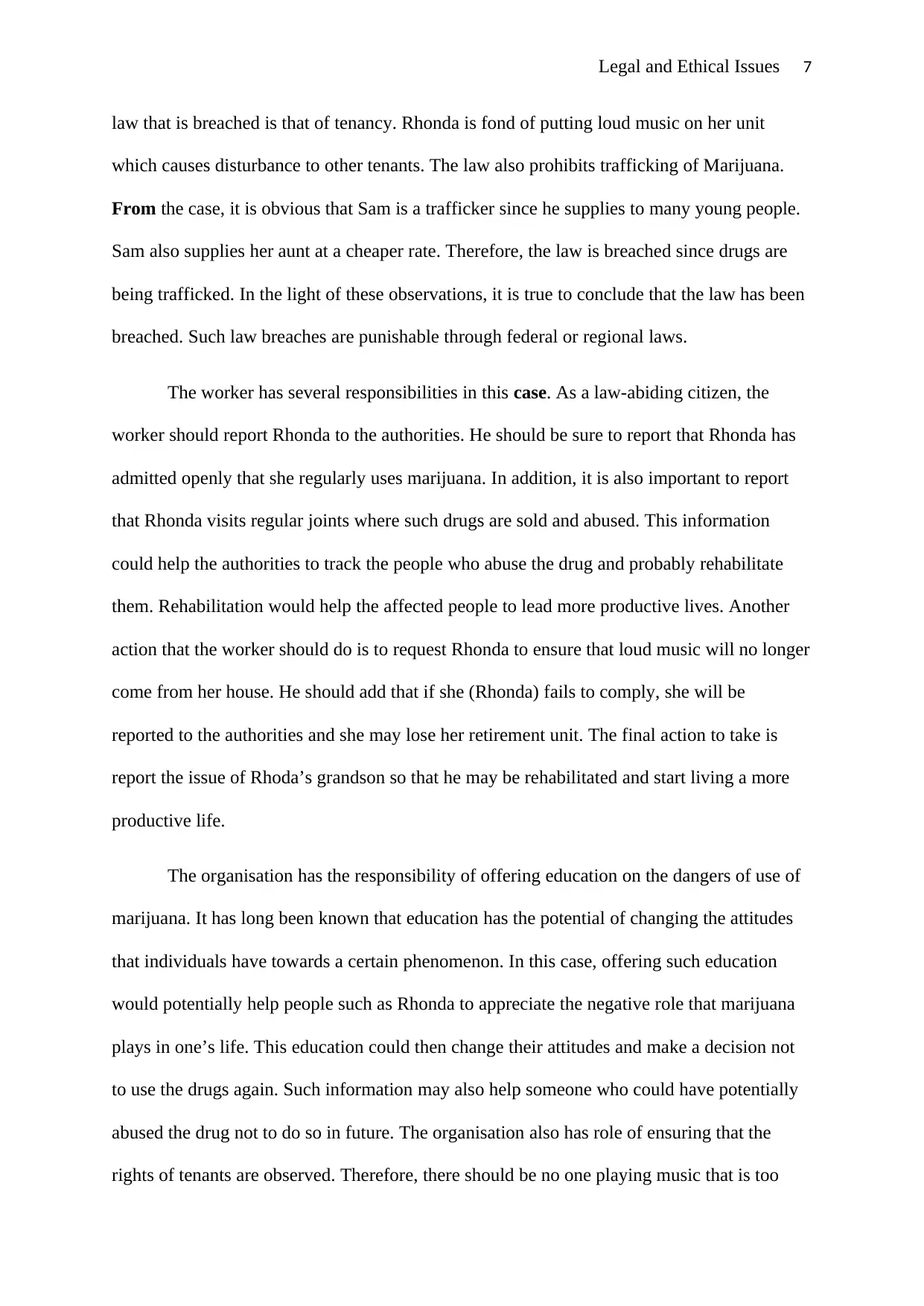
Legal and Ethical Issues 7
law that is breached is that of tenancy. Rhonda is fond of putting loud music on her unit
which causes disturbance to other tenants. The law also prohibits trafficking of Marijuana.
From the case, it is obvious that Sam is a trafficker since he supplies to many young people.
Sam also supplies her aunt at a cheaper rate. Therefore, the law is breached since drugs are
being trafficked. In the light of these observations, it is true to conclude that the law has been
breached. Such law breaches are punishable through federal or regional laws.
The worker has several responsibilities in this case. As a law-abiding citizen, the
worker should report Rhonda to the authorities. He should be sure to report that Rhonda has
admitted openly that she regularly uses marijuana. In addition, it is also important to report
that Rhonda visits regular joints where such drugs are sold and abused. This information
could help the authorities to track the people who abuse the drug and probably rehabilitate
them. Rehabilitation would help the affected people to lead more productive lives. Another
action that the worker should do is to request Rhonda to ensure that loud music will no longer
come from her house. He should add that if she (Rhonda) fails to comply, she will be
reported to the authorities and she may lose her retirement unit. The final action to take is
report the issue of Rhoda’s grandson so that he may be rehabilitated and start living a more
productive life.
The organisation has the responsibility of offering education on the dangers of use of
marijuana. It has long been known that education has the potential of changing the attitudes
that individuals have towards a certain phenomenon. In this case, offering such education
would potentially help people such as Rhonda to appreciate the negative role that marijuana
plays in one’s life. This education could then change their attitudes and make a decision not
to use the drugs again. Such information may also help someone who could have potentially
abused the drug not to do so in future. The organisation also has role of ensuring that the
rights of tenants are observed. Therefore, there should be no one playing music that is too
law that is breached is that of tenancy. Rhonda is fond of putting loud music on her unit
which causes disturbance to other tenants. The law also prohibits trafficking of Marijuana.
From the case, it is obvious that Sam is a trafficker since he supplies to many young people.
Sam also supplies her aunt at a cheaper rate. Therefore, the law is breached since drugs are
being trafficked. In the light of these observations, it is true to conclude that the law has been
breached. Such law breaches are punishable through federal or regional laws.
The worker has several responsibilities in this case. As a law-abiding citizen, the
worker should report Rhonda to the authorities. He should be sure to report that Rhonda has
admitted openly that she regularly uses marijuana. In addition, it is also important to report
that Rhonda visits regular joints where such drugs are sold and abused. This information
could help the authorities to track the people who abuse the drug and probably rehabilitate
them. Rehabilitation would help the affected people to lead more productive lives. Another
action that the worker should do is to request Rhonda to ensure that loud music will no longer
come from her house. He should add that if she (Rhonda) fails to comply, she will be
reported to the authorities and she may lose her retirement unit. The final action to take is
report the issue of Rhoda’s grandson so that he may be rehabilitated and start living a more
productive life.
The organisation has the responsibility of offering education on the dangers of use of
marijuana. It has long been known that education has the potential of changing the attitudes
that individuals have towards a certain phenomenon. In this case, offering such education
would potentially help people such as Rhonda to appreciate the negative role that marijuana
plays in one’s life. This education could then change their attitudes and make a decision not
to use the drugs again. Such information may also help someone who could have potentially
abused the drug not to do so in future. The organisation also has role of ensuring that the
rights of tenants are observed. Therefore, there should be no one playing music that is too
Paraphrase This Document
Need a fresh take? Get an instant paraphrase of this document with our AI Paraphraser
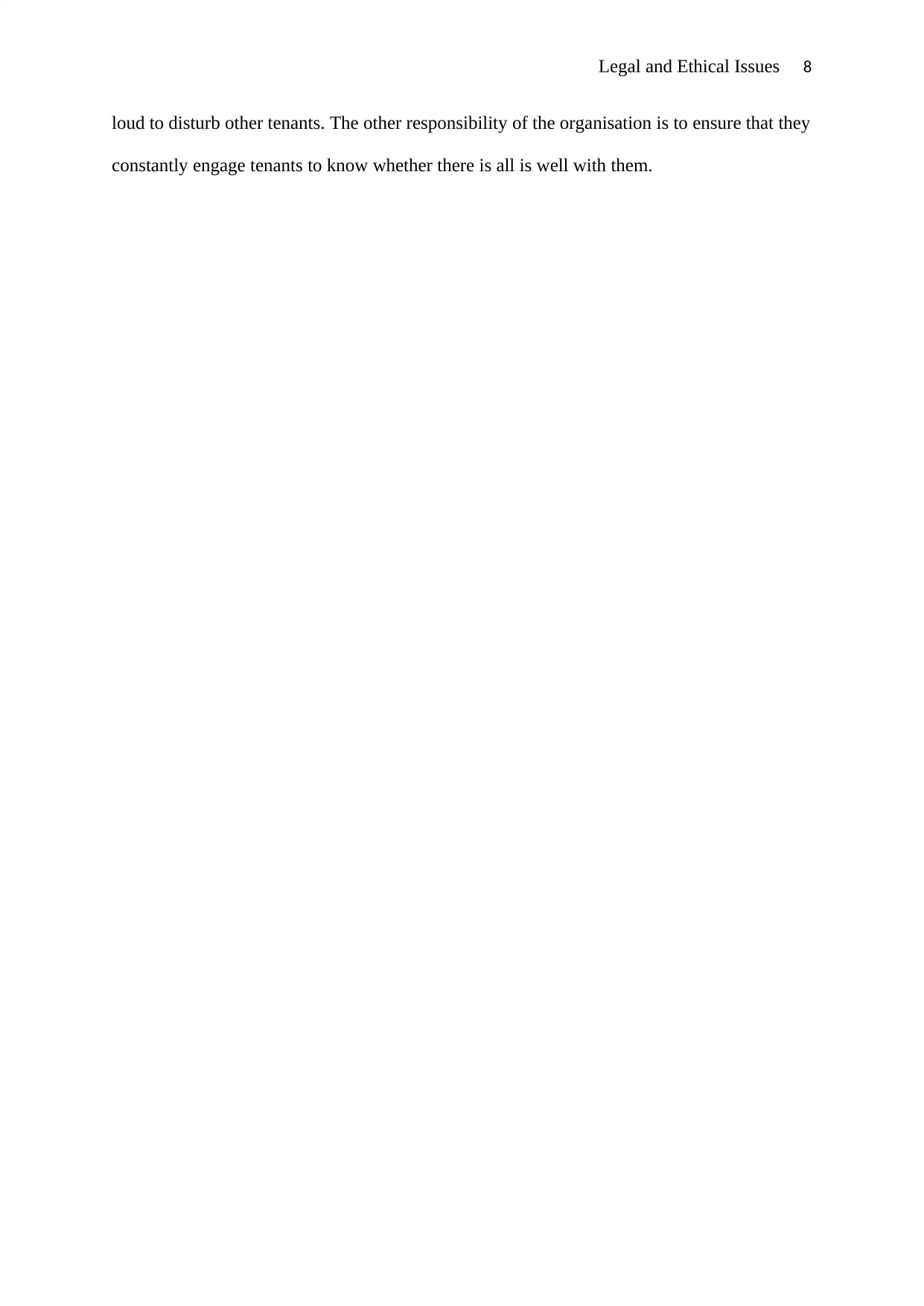
Legal and Ethical Issues 8
loud to disturb other tenants. The other responsibility of the organisation is to ensure that they
constantly engage tenants to know whether there is all is well with them.
loud to disturb other tenants. The other responsibility of the organisation is to ensure that they
constantly engage tenants to know whether there is all is well with them.
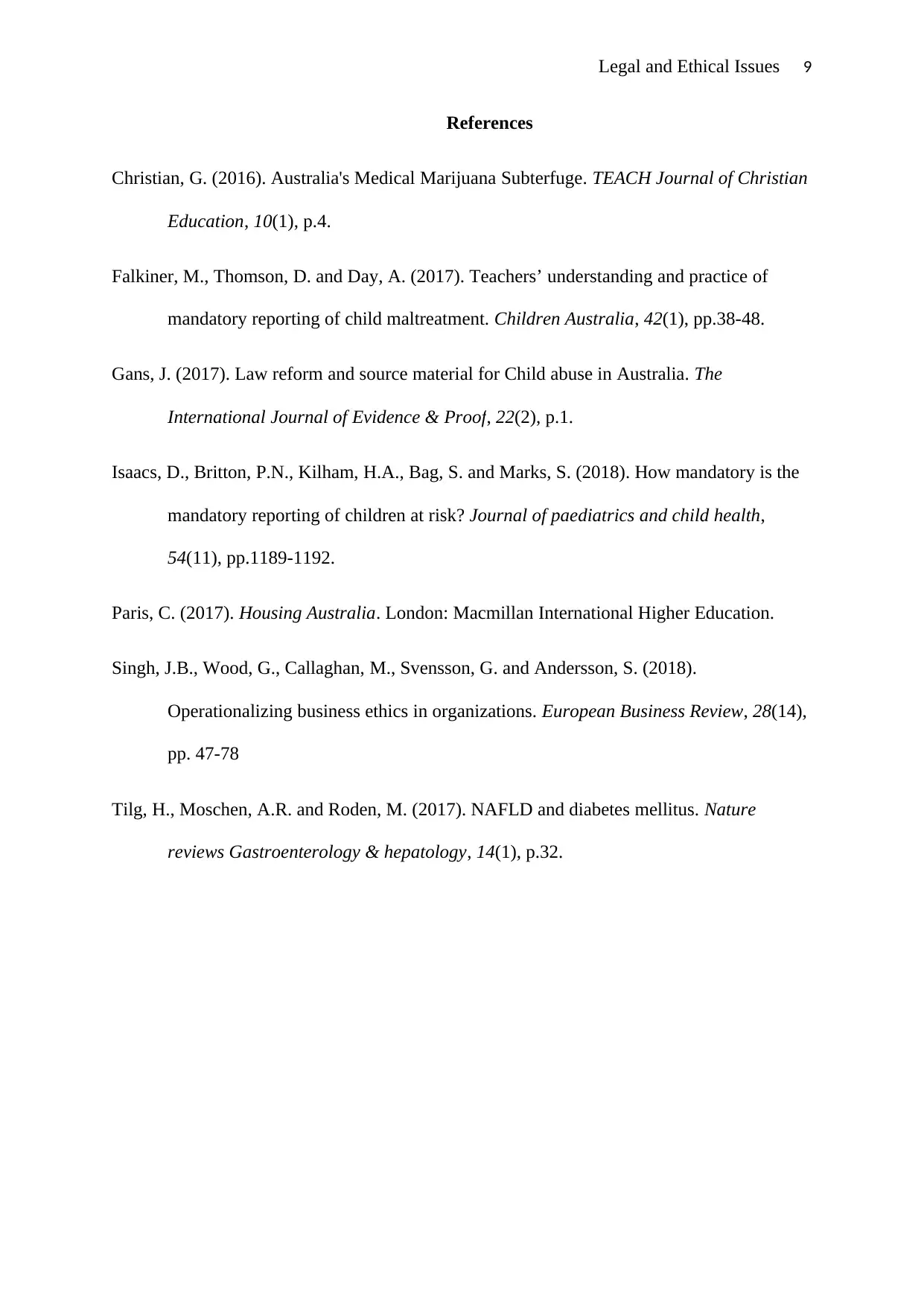
Legal and Ethical Issues 9
References
Christian, G. (2016). Australia's Medical Marijuana Subterfuge. TEACH Journal of Christian
Education, 10(1), p.4.
Falkiner, M., Thomson, D. and Day, A. (2017). Teachers’ understanding and practice of
mandatory reporting of child maltreatment. Children Australia, 42(1), pp.38-48.
Gans, J. (2017). Law reform and source material for Child abuse in Australia. The
International Journal of Evidence & Proof, 22(2), p.1.
Isaacs, D., Britton, P.N., Kilham, H.A., Bag, S. and Marks, S. (2018). How mandatory is the
mandatory reporting of children at risk? Journal of paediatrics and child health,
54(11), pp.1189-1192.
Paris, C. (2017). Housing Australia. London: Macmillan International Higher Education.
Singh, J.B., Wood, G., Callaghan, M., Svensson, G. and Andersson, S. (2018).
Operationalizing business ethics in organizations. European Business Review, 28(14),
pp. 47-78
Tilg, H., Moschen, A.R. and Roden, M. (2017). NAFLD and diabetes mellitus. Nature
reviews Gastroenterology & hepatology, 14(1), p.32.
References
Christian, G. (2016). Australia's Medical Marijuana Subterfuge. TEACH Journal of Christian
Education, 10(1), p.4.
Falkiner, M., Thomson, D. and Day, A. (2017). Teachers’ understanding and practice of
mandatory reporting of child maltreatment. Children Australia, 42(1), pp.38-48.
Gans, J. (2017). Law reform and source material for Child abuse in Australia. The
International Journal of Evidence & Proof, 22(2), p.1.
Isaacs, D., Britton, P.N., Kilham, H.A., Bag, S. and Marks, S. (2018). How mandatory is the
mandatory reporting of children at risk? Journal of paediatrics and child health,
54(11), pp.1189-1192.
Paris, C. (2017). Housing Australia. London: Macmillan International Higher Education.
Singh, J.B., Wood, G., Callaghan, M., Svensson, G. and Andersson, S. (2018).
Operationalizing business ethics in organizations. European Business Review, 28(14),
pp. 47-78
Tilg, H., Moschen, A.R. and Roden, M. (2017). NAFLD and diabetes mellitus. Nature
reviews Gastroenterology & hepatology, 14(1), p.32.
⊘ This is a preview!⊘
Do you want full access?
Subscribe today to unlock all pages.

Trusted by 1+ million students worldwide
1 out of 9
Your All-in-One AI-Powered Toolkit for Academic Success.
+13062052269
info@desklib.com
Available 24*7 on WhatsApp / Email
![[object Object]](/_next/static/media/star-bottom.7253800d.svg)
Unlock your academic potential
Copyright © 2020–2025 A2Z Services. All Rights Reserved. Developed and managed by ZUCOL.
